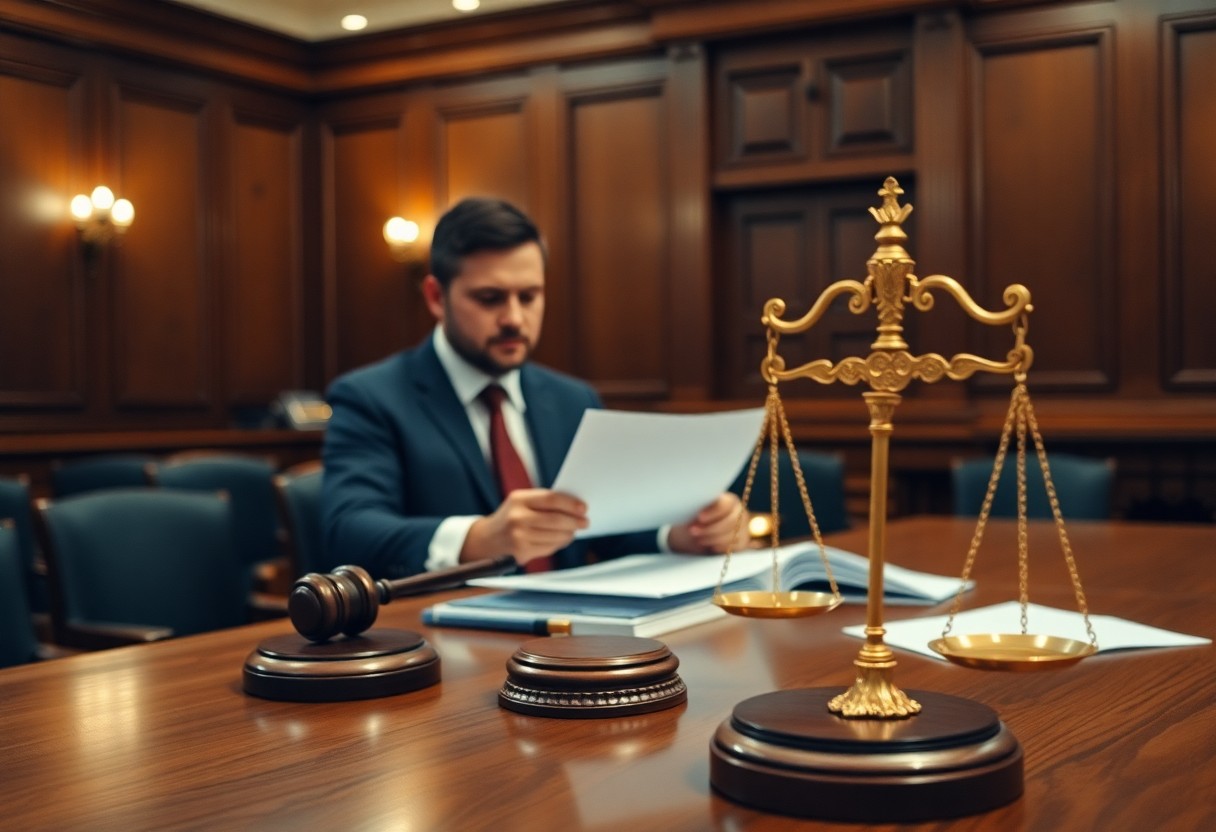As a psychology expert witness, you will inevitably encounter complex legal procedures. You need to understand the legal framework to provide effective testimony. Your role is to provide objective, unbiased opinions, and navigating the legal system is necessary to your success. You will learn how to prepare for legal proceedings, and your knowledge will be tested. By following the right steps, you can ensure your expertise is utilized effectively in legal cases, making your testimony more impactful.
Key Takeaways:
- Understanding the legal framework is vital for psychology expert witnesses to provide effective testimony and maintain their credibility in court, requiring a thorough knowledge of the relevant laws, rules, and procedures that govern their practice.
- Psychology expert witnesses should be aware of their role and limitations within the legal system, including the importance of objectivity, impartiality, and adherence to professional standards, to ensure their opinions are admissible and influential in legal proceedings.
- Developing a systematic approach to navigating the legal framework, including preparation, communication, and testimony, can help psychology expert witnesses to build strong relationships with attorneys, provide clear and concise testimony, and withstand cross-examination, ultimately enhancing the impact of their expert opinions in court.

Establishing Expertise
Your expertise as a psychology expert witness is the foundation of your credibility in court. It is vital to demonstrate your knowledge and experience in the field of psychology to establish trust with the judge, jury, and attorneys.
Defining the Role of a Psychology Expert Witness
Expertly navigating the legal system requires a deep understanding of your role as a psychology expert witness. You must be able to clearly define your area of expertise and explain how your knowledge applies to the case at hand.
Building Credibility in the Field
Expertly building your reputation as a psychology expert witness takes time and effort. You need to establish yourself as an authority in your field through publications, presentations, and a strong track record of testimony.
In addition to establishing your reputation, you should also focus on continuously updating your knowledge and skills to stay current with the latest research and developments in the field of psychology. This will help you to provide accurate and reliable testimony, and to maintain your credibility as an expert witness. You will be able to provide more effective testimony and build trust with the court by staying up-to-date with the latest information and advancements in your field.
Familiarizing with Legal Proceedings
If you are a psychology expert witness, understanding the legal framework is vital to effectively navigate the system.
Overview of the Legal System
Systematically, you will encounter various legal proceedings, and it is vital that you have a basic understanding of how the system operates, including the different types of courts and the rules that govern them.
Key Players in the Courtroom
Around the courtroom, you will find several key players, including judges, lawyers, and jurors, each with their own distinct role to play in the legal process.
And as you become more familiar with these key players, you will begin to understand how they interact with each other and with you, as an expert witness, to shape the outcome of a case, and you will learn how to effectively communicate your expertise to them, which is vital to presenting a strong case.
Preparing for Testimony
After you have been engaged as an expert witness, your preparation for testimony begins. This involves several steps to ensure you are well-equipped to provide effective testimony.
Reviewing Relevant Documents and Evidence
Behind every successful testimony lies thorough preparation, and for you, this means reviewing all relevant documents and evidence related to the case, familiarizing yourself with the details to provide accurate and informed opinions.
Anticipating Cross-Examination Questions
Against the backdrop of your thorough preparation, you should anticipate the types of questions you may face during cross-examination, considering the strengths and weaknesses of your opinions and the evidence.
Further, anticipating cross-examination questions allows you to prepare clear and concise responses, addressing potential challenges to your testimony and demonstrating your expertise, which is vital for you to present your opinions confidently and credibly in court, helping you to withstand scrutiny and effectively communicate your findings to the judge or jury.
Developing Effective Communication Skills
Unlike other expert witnesses, as a psychology expert witness, you will be working closely with legal professionals, judges, and jurors who may not have a background in psychology. To effectively communicate your expertise, you need to develop strong communication skills that can help you convey complex psychological concepts in a clear and concise manner.
Clear and Concise Testimony
Efficiently, you will need to provide testimony that is easy to understand, avoiding unnecessary details and focusing on the key points that support your opinion.
Avoiding Technical Jargon
Along with simplifying your language, you should also avoid using technical terms that may be unfamiliar to non-experts, instead opting for plain language that can be easily understood by all parties involved.
In addition, to avoid using technical jargon, you can use analogies or examples to explain complex psychological concepts, making it easier for the jury or judge to grasp the information and understand your expert opinion, which will ultimately strengthen your testimony and increase your credibility as a psychology expert witness.
Navigating Ethical Considerations
Now, as a psychology expert witness, you must consider the ethical implications of your role in legal proceedings.
As you navigate the legal framework, your ethical obligations are multifaceted, and you should be aware of the various considerations that apply to your work.
Maintaining Objectivity and Impartiality
Beneath the surface of your expert testimony lies the need to maintain objectivity and impartiality, and you should strive to provide unbiased opinions, unaffected by personal beliefs or interests.
Managing Conflicts of Interest
For your own protection and the integrity of the legal process, you should be aware of potential conflicts of interest that may arise, and take steps to mitigate them.
Interest in a particular outcome can compromise your credibility, and you should take care to avoid situations where your personal interests may influence your testimony, and develop strategies to manage such conflicts, such as disclosing potential conflicts or withdrawing from a case if necessary, to ensure the integrity of your expert opinion and maintain the trust of the court.
Staying Current with Legal and Psychological Developments
Keep up-to-date with the latest developments in both law and psychology to maintain your credibility as an expert witness. Your expertise must be current and relevant to the case at hand.
Continuing Education and Professional Development
After completing your initial training, you will need to pursue ongoing education and development to stay current with the latest research, techniques, and best practices in your field, ensuring your expertise remains relevant and effective.
Staying Abreast of Relevant Research and Literature
Below the surface of everyday practice, new research and findings are constantly emerging, and you must be aware of these developments to provide authoritative testimony.
Research in psychology and law is continually evolving, and you need to stay informed about the latest studies, publications, and expert opinions to provide accurate and reliable expert testimony, demonstrating your commitment to your profession and enhancing your credibility in the eyes of the court.
To wrap up
From above, you now have a comprehensive understanding of the legal framework. You have learned the 7 steps to navigate it successfully as a psychology expert witness. You can apply your knowledge to build a strong foundation for your practice, ensuring your expertise is presented effectively in legal proceedings. By following these steps, you will be well-prepared to provide high-quality testimony and support your clients’ cases, ultimately enhancing your credibility as a psychology expert witness. Your expertise will be invaluable in the legal system.
FAQ
Q: What is the primary goal of navigating the legal framework for psychology expert witnesses?
A: The primary goal of navigating the legal framework for psychology expert witnesses is to provide a clear understanding of the legal process and the role of the expert witness within it. This understanding is imperative for psychology expert witnesses to effectively communicate their opinions and contribute to the legal decision-making process. By grasping the legal framework, expert witnesses can ensure that their testimony is admissible, relevant, and helpful to the court.
Q: What are the key steps involved in navigating the legal framework for psychology expert witnesses?
A: The 7 key steps involved in navigating the legal framework for psychology expert witnesses include: (1) understanding the legal context of the case, (2) reviewing relevant laws and regulations, (3) familiarizing oneself with the court’s rules and procedures, (4) developing a thorough understanding of the expert witness’s role and responsibilities, (5) preparing a comprehensive and well-organized report, (6) anticipating and preparing for cross-examination, and (7) maintaining professional objectivity and integrity throughout the process.
Q: How can psychology expert witnesses ensure their testimony is admissible in court?
A: Psychology expert witnesses can ensure their testimony is admissible in court by: (1) staying up-to-date with the latest scientific research and methodologies, (2) using reliable and validated assessment tools, (3) providing clear and concise explanations of their opinions and methods, (4) avoiding speculation and unsubstantiated claims, and (5) being transparent about the limitations of their expertise and the potential biases that may influence their opinions. Additionally, expert witnesses should be prepared to demonstrate the relevance and reliability of their testimony to the court.
Q: What are some common challenges faced by psychology expert witnesses in navigating the legal framework?
A: Some common challenges faced by psychology expert witnesses in navigating the legal framework include: (1) communicating complex psychological concepts to non-expert legal professionals, (2) managing the stress and pressure of testifying in court, (3) dealing with aggressive or confrontational cross-examination, (4) maintaining objectivity and avoiding being swayed by the legal team’s arguments, and (5) staying current with the latest legal precedents and developments that may impact their testimony. Effective preparation, support from colleagues, and a clear understanding of the legal framework can help mitigate these challenges.
Q: How can psychology expert witnesses maintain their professional integrity and objectivity throughout the legal process?
A: Psychology expert witnesses can maintain their professional integrity and objectivity throughout the legal process by: (1) adhering to the ethical guidelines and standards of their profession, (2) avoiding conflicts of interest and disclosing any potential biases, (3) providing unbiased and impartial opinions, (4) being transparent about their methods and limitations, and (5) being prepared to withstand scrutiny and criticism of their testimony. Additionally, expert witnesses should prioritize their professional development and seek support from peers and mentors to ensure they are equipped to navigate the complexities of the legal system while maintaining their integrity and objectivity.





